This Dog Was Abandoned Because He Doesn’t Have a Neck!
This is the story of Cooper, a beautiful dog with no neck living with a rare genetic condition known as short spine syndrome. Fortunately, Cooper now lives with a loving rescue facility that took a chance on him, encouraging him to live life with happiness as his true self. Unfortunately, many short spined dogs aren’t so lucky.
Cooper’s Story
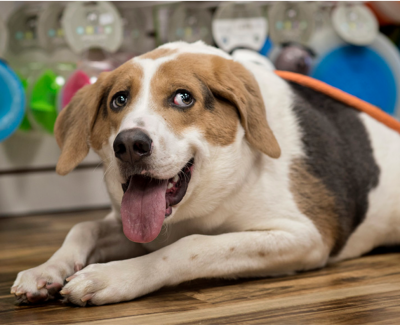
Cooper was born with this rare condition that shortens a dog’s spinal column and literally made him look like a dog with no nec. Short spine syndrome compacts a dog’s vertebrae and makes them appear shrunken. But the condition impacts the dog beyond just aesthetics. It will sometimes impact a dog’s ability to eat properly, will cause problems going to the bathroom, and cause other various functional difficulties like making it hard for a dog to scratch themselves.
After a good samaritan called about a stray dog on her porch, animal control rescued Cooper and brought him to a generous rescue group, Secondhand Hounds.
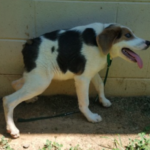
In the south, there is a large hunting dog population for Cooper’s breed. One of the breeding facilities likely had a litter and noticed Cooper was unique, so they let him go.
When Cooper first arrived at Secondhand Hounds, he was thin, matted, and shy. But now, he is no longer shy and is trusting of people. His goofy, sweet, and fun side is coming out more every day.
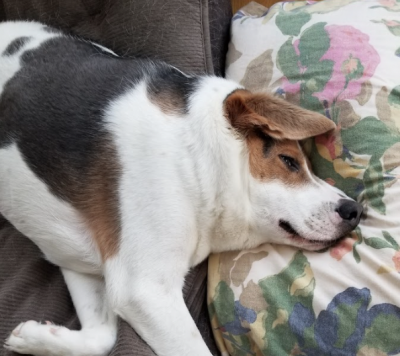
Because of Cooper’s deformity, the folks at Secondhand Hounds soon realized that his needs remained uncertain. It would be a lot for most foster parents to take on.
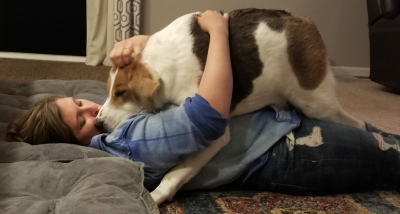
Fortunately, Secondhand Hounds and kind folks like Ely Keegan, Cooper’s forever foster parent, understand what makes Cooper different and can provide him with proper care for years to come.
Today, Cooper continues to lead a normal, happy life. He’s the perfect testament to educating others about short spine syndrome and showing that a dog with no neck can still lead a happy life. And best of all, Cooper loves making people smile!
Short Spine Syndrome
A rare genetic condition that shortens a dog’s spine from birth, short spine syndrome can cause health issues in dogs from an early age.
Typical characteristics include:
- Sloped back
- Barrel chest
- Short, wide neck
- Elongated jaw
- Small stature
- Possibly no tail
- Bobbed or short tail
- Long rear legs
Life Expectancy for dogs with short spine syndrome
Normal puppy activities, such as eating from a bowl or picking up toys, are difficult for dogs with short spine syndrome. However, short-spined dogs can still live active, healthy lifestyles.
And fortunately, short spine syndrome will not shorten a dog’s lifespan! One of the oldest dogs with short spine syndrome passed away at 14 years old.
I’m going to share several other cases of dogs that lead happy lives today! Keep reading for more happy stories like Cooper’s.
Health Issues For Short Spined Dogs
Since short spined dogs have a rare genetic condition, they will likely face health issues throughout their lifetime. This condition causes the vertebrae to fuse, leading to characteristics like fewer ribs, a hunched back, and a less flexible spine.
With proper care and love, dogs with short spine syndrome can overcome their health struggles and lead a long life. Most short-spine dogs are not in frequent pain either.
Can Humans Have Short Spine Syndrome?
Yes. Humans with short spine syndrome have a similar condition called Klippel Feil syndrome (KFS), a condition fusing two or more vertebrae in the neck. Like short spine syndrome in dogs, KFS is a rare bone disorder that occurs from birth. A typical characteristic of KFS is a sloped back.
Meet 9 Other Short Spined Dogs
Social media creates a special platform for us, providing an inside look into other dogs with differences. I believe these special dogs can educate all of us about love, acceptance, and inclusion. Just because a dog may look a little different, it doesn’t mean they don’t deserve love and care.
Let’s meet more incredible short spined dogs that live happy, playful lives today!
1. Squishy
Squishy is a dog with short spine syndrome living in Utah. After dog-sitting Squishy for his foster family one weekend, loving owners Joe and Sally fell in love with him and decided to adopt him.
2. Ivy
Ivy is a pit bull mix that is active on TikTok and loves hanging with her fur siblings Gio and Ortley. She appears to have been in her loving home since early 2021. Ivy really looks like a dog with no neck!
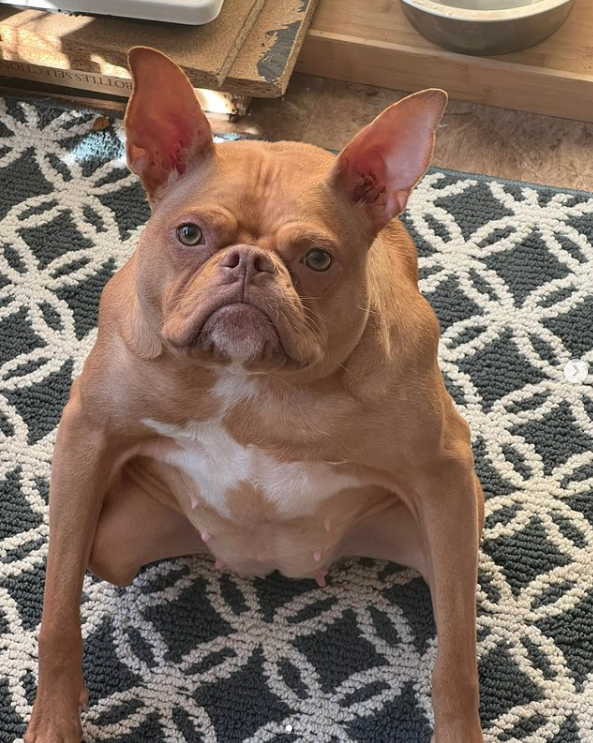
3. MoMo
MoMo appears to have been rescued by his loving family in early 2020. He moved from Texas to Florida where he now enjoys plenty of playtime with his dog brother, Triple.
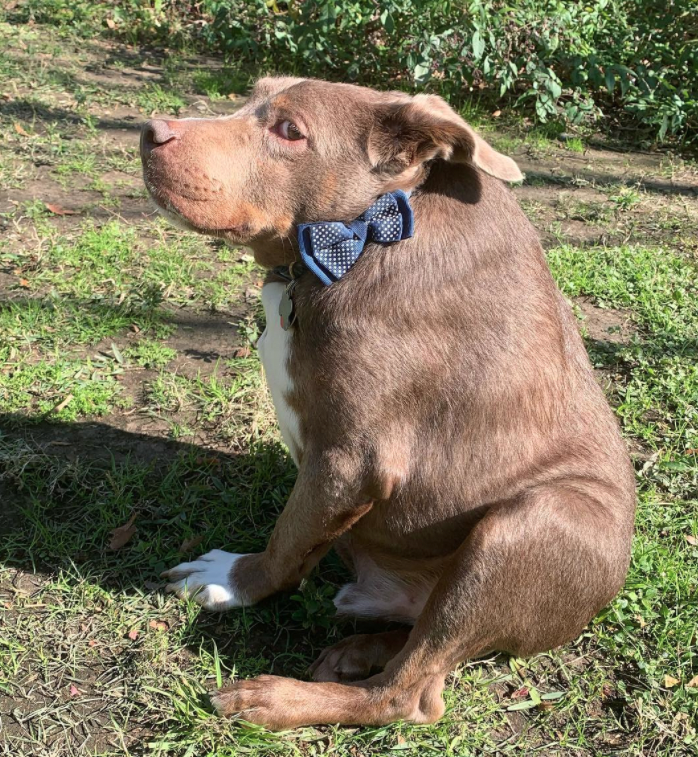
4. Tilly
Tilly is two years old and was rescued in 2019. She is a Tibetan spaniel mix with a loving personality and sweet disposition.
5. Skippy
Skippy is a short-spined chihuahua pup with a fun personality and a fashionable wardrobe. He’s a little guy with a big heart that loves cuddling with his pup brother, Gary.
6. Pitchula
Pitchula is a special female pup named after a popular Brazilian soft drink that comes in a short bottle. She is one of the only known short spine syndrome cases in Brazil.
7. Danko
Danko is a golden retriever with a big heart and a happy smile. He loves taking long strolls on the beach and spending plenty of time playing and cuddling with his family.
8. Vicky: A Short Spine Bulldog
Vicky is a short spine bulldog with dwarfism that lives with loving owner Bonnie Brock. Even with missing hip joints, she loves active playtime sessions with her toys and cuddling with her loving family.
9. Phoebe: Sweet Pit Bull With Short Spine Syndrome
Phoebe is a sweet pit bull pup with short spine syndrome. She loves playing fetch with her family every day. Phoebe’s family hopes that by documenting her daily adventures with short spine syndrome on social media, she can teach others about love, tolerance, inclusion, and acceptance.
By reading other stories of short-spined dogs that are as loving, fun, and playful as any other dog, I hope you can see how important these dogs are in the world. I believe that every dog deserves a fair opportunity to be loved and cared for the right way, and short-spined dogs are proof that even rare genetic conditions won’t stop them from living a full, happy life.
Dogs with differences are incredible and deserve as much care and love as other dogs out there! Stories like Cooper’s and other dogs with short spine syndrome that I mentioned are inspiring. These special dogs remind us that all pups deserve their forever home, no matter their differences.
FAQs
What is Short Spine Syndrome in dogs?
Short Spine Syndrome is a rare congenital condition that affects the vertebral development in dogs. It results in a significantly shorter spine than the average dog, giving them a distinct appearance.
What causes Short Spine Syndrome?
The exact cause of Short Spine Syndrome is not yet fully understood. It is believed to be a genetic mutation that occurs during embryonic development, affecting the proper growth and formation of the spinal column.
How does Short Spine Syndrome affect dogs?
Short Spine Syndrome can lead to various skeletal abnormalities, including a shortened and rigid spine, fused vertebrae, and altered bone structures. These abnormalities can impact the dog’s mobility and posture.
Can dogs with Short Spine Syndrome live a normal life?
Yes, dogs with Short Spine Syndrome can live fulfilling lives. While their physical appearance and mobility may be different from other dogs, with appropriate care, accommodations, and a supportive environment, they can lead happy and active lives.
Are there specific dog breeds more prone to Short Spine Syndrome?
Short Spine Syndrome is not limited to specific breeds but has been observed in various breeds and mixed-breed dogs. It is considered a rare condition, and its occurrence is sporadic.
Can Short Spine Syndrome cause health issues in dogs?
In addition to the physical deformities associated with Short Spine Syndrome, affected dogs may be more prone to certain health issues. These can include spinal problems, joint abnormalities, and potential complications related to mobility and posture.
Is Short Spine Syndrome preventable or curable?
Short Spine Syndrome is a congenital condition, meaning it is present from birth. Currently, there is no known cure or preventive measure to eliminate the syndrome. Treatment focuses on managing any associated health concerns and providing supportive care for affected dogs.
Can dogs with Short Spine Syndrome participate in physical activities?
The activity levels and capabilities of dogs with Short Spine Syndrome may vary depending on the severity of their condition. While some dogs may have limited mobility or exercise tolerance, others may still be able to engage in gentle activities with proper supervision and accommodations.
Are there support groups or organizations for dogs with Short Spine Syndrome?
Yes, there are support groups and organizations that provide resources, information, and community support for owners of dogs with Short Spine Syndrome. These groups can offer guidance, share experiences, and help connect individuals facing similar challenges.
1.Short Spine Syndrome Support Group is a Facebook group that connects owners of dogs with Short Spine Syndrome and provides information, advice, and emotional support
2. Secondhand Hounds is a nonprofit animal rescue organization that has helped several dogs with Short Spine Syndrome find loving homes. They also raise awareness and funds for this condition through their social media accounts.
3. Unique is a charity that supports anyone who has a family member with a rare chromosome or single gene disorder, including dogs. They provide information, advice, and emotional support to families and individuals affected by these conditions.
4. Directory of Genetic and Rare Disease Support Groups is a website that lists various support groups for different genetic and rare diseases, both in humans and animals. You can search by disease name, location, or category to find a group that suits your needs.
5. Ten inherited disorders in purebred dogs by functional breed groupings is a research article that identifies the most common inherited disorders in different groups of purebred dogs, based on their genomic similarities and functional roles. This may help you understand the genetic background and health risks of your dog’s breed or mix.
How can I provide the best care for a dog with Short Spine Syndrome?
Providing optimal care for a dog with Short Spine Syndrome involves regular veterinary check-ups, monitoring for any health issues, maintaining a balanced diet, and adapting the home environment to accommodate their specific needs. Consultation with a veterinarian experienced in caring for dogs with congenital conditions is highly recommended.









